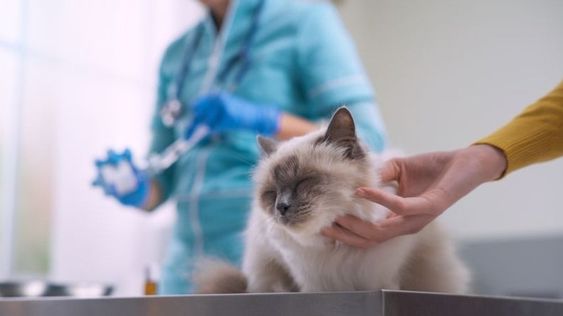How Often Do You Take a Cat to the Vet
How often you should take your cat to the vet depends on several factors including their age, health status, and any specific medical conditions they may have. Here’s a general guideline:
- Annual Check-ups: Just like humans, cats should ideally have an annual check-up with the vet. These routine visits allow the vet to monitor your cat’s overall health, administer vaccinations if needed, and address any concerns you may have.
- Senior Cats: As cats age, they may require more frequent veterinary visits. Senior cats (usually over 7 years old) may benefit from bi-annual check-ups to monitor for age-related health issues such as arthritis, kidney disease, or dental problems.
- Kittens and Young Cats: Kittens require more frequent vet visits initially for vaccinations, deworming, and spaying/neutering. Your vet will provide a schedule for these early visits. After the initial rounds of vaccinations, your young cat may follow the annual check-up schedule. Read about How Long Can a Cat Go Without Eating
- Health Issues: Cats with chronic health conditions or those prone to certain illnesses may require more frequent vet visits as recommended by the vet.
- Behavioral Changes or Concerns: If you notice any sudden changes in your cat’s behavior, eating habits, or activity levels, it’s important to schedule a vet visit promptly.
Remember, regular vet visits can help catch potential health issues early, leading to better outcomes for your cat’s health and well-being.
Understanding Your Cat’s Health Needs
Cats are masters at masking signs of illness, making it challenging to detect health issues early on. As pet owners, it’s essential to be vigilant and watch out for subtle changes in behavior or appearance that might indicate underlying health problems.

Frequency of Vet Visits for Cats
The frequency of vet visits for cats varies based on several factors, including age, health condition, and lifestyle. Generally, kittens and senior cats require more frequent check-ups compared to adult cats in their prime years.
Factors Influencing Vet Visit Frequency
Age and Health Condition of the Cat
Kittens require regular visits during their first year for vaccinations, deworming, and wellness exams. Senior cats, on the other hand, may need more frequent check-ups to monitor age-related conditions such as arthritis or kidney disease.
Indoor vs. Outdoor Cats
Outdoor cats face additional risks, including exposure to parasites and infectious diseases. Consequently, they may require more frequent vet visits to address these potential health concerns. Discover about Can Dogs Eat Popcorn
Common Health Issues in Cats
From dental problems to urinary tract issues, cats are susceptible to various health conditions. Regular vet visits enable early detection and treatment of these issues, improving your cat’s quality of life and longevity.
Establishing a Vet Care Routine
Consistency is key when it comes to maintaining your cat’s health. Establishing a vet care routine involves scheduling annual wellness exams, vaccinations, and preventive treatments such as flea and tick control.
Tips for a Successful Vet Visit with Your Cat
Visiting the vet can be stressful for both you and your feline friend. To ensure a smooth experience, it’s essential to prepare your cat beforehand and address any anxieties they may have about the vet clinic.
Importance of Preventive Care for Cats
Preventive care plays a crucial role in keeping your cat healthy and happy. Regular dental check-ups, parasite prevention, and proper grooming not only prevent diseases but also promote overall well-being.
Cost Considerations for Vet Visits
While vet care is essential, it can also be expensive. Budgeting for routine check-ups and potential emergencies is necessary to provide your cat with the care they need without straining your finances.

Resources for Low-Cost Vet Care Options
For pet owners on a tight budget, there are several options available for affordable vet care, including community clinics, low-cost vaccination clinics, and pet insurance plans.
Conclusion
Regular vet visits are essential for maintaining your cat’s health and detecting potential issues early on. By understanding your cat’s unique health needs and establishing a proactive vet care routine, you can ensure that your feline companion leads a long, happy life.
FAQs
- How often should I take my cat to the vet for routine check-ups?
- Most veterinarians recommend annual wellness exams for adult cats and more frequent visits for kittens and senior cats.
- What vaccinations does my cat need, and how often should they be administered?
- Vaccination protocols may vary based on your cat’s age, lifestyle, and risk factors. Your veterinarian can recommend a personalized vaccination schedule for your cat.
- What are some signs that my cat needs immediate medical attention?
- Symptoms such as difficulty breathing, persistent vomiting or diarrhea, lethargy, and changes in appetite or behavior warrant prompt veterinary care.
- How can I prepare my cat for a vet visit to reduce stress?
- Gradually acclimate your cat to their carrier, offer treats and positive reinforcement, and use calming pheromone sprays or diffusers to create a soothing environment.
- Are there any financial assistance programs available for pet owners struggling to afford vet care?
- Yes, many organizations offer financial aid, discounted services, or payment plans for pet owners facing financial hardship.




